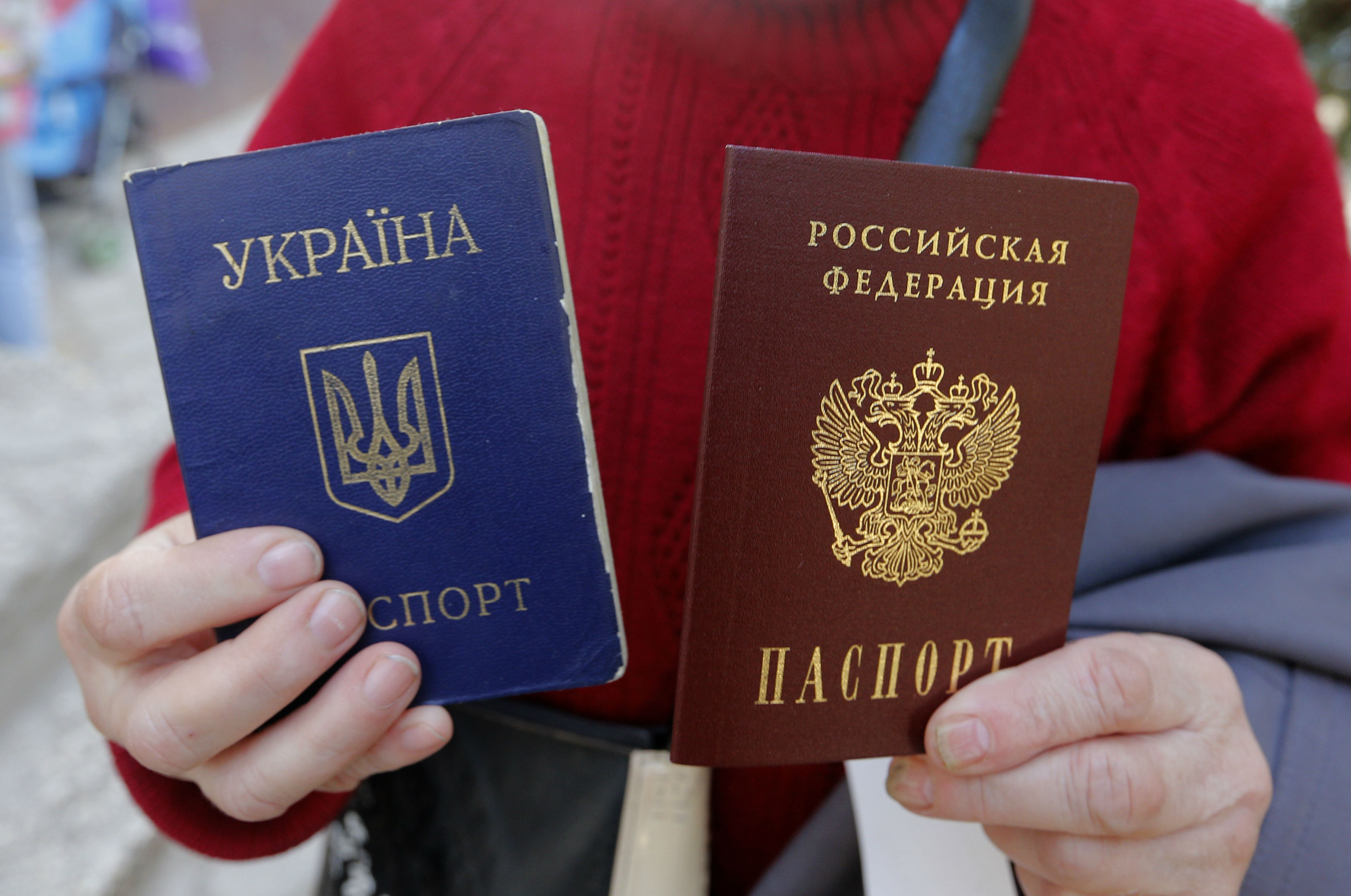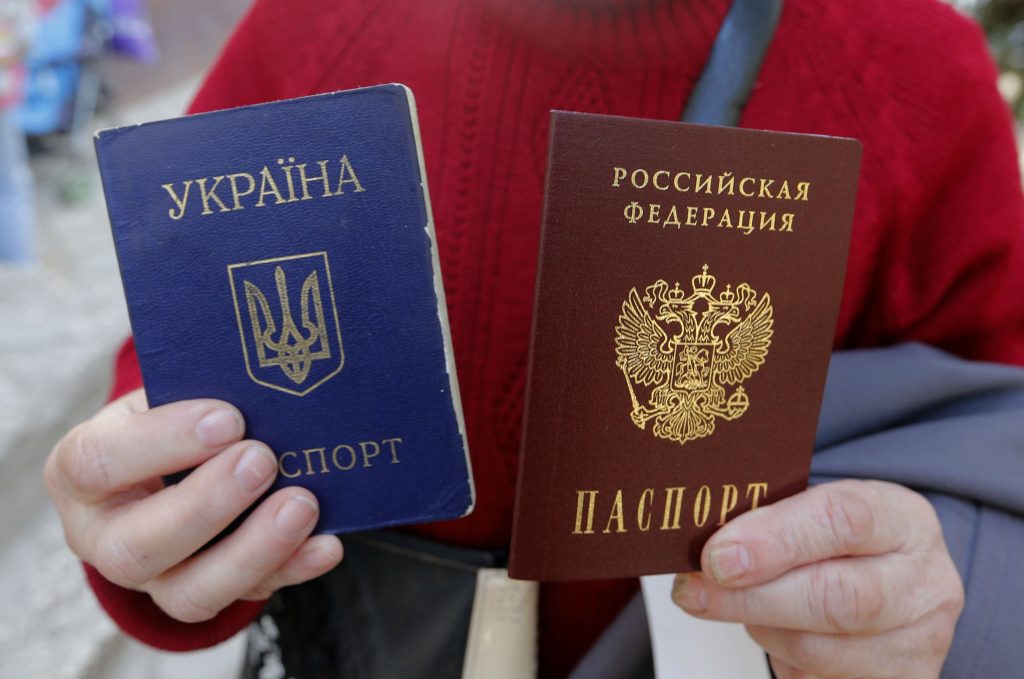 On June 29, US President Donald Trump told reporters that recognizing Russia’s illegal land grab of Ukraine’s Crimea is on the table when he meets President Vladimir Putin in July. While the White House has since backed away and insisted that US policy hasn’t changed, the president and his staff may need a refresher.
On June 29, US President Donald Trump told reporters that recognizing Russia’s illegal land grab of Ukraine’s Crimea is on the table when he meets President Vladimir Putin in July. While the White House has since backed away and insisted that US policy hasn’t changed, the president and his staff may need a refresher.
In March 2014, thousands of Ukrainian citizens automatically became Russian citizens whether they wanted to or not. When Russia illegally annexed Crimea, anyone who had been born in Crimea or anyone with a Crimean residence permit was given Russian citizenship. At least 3,500 Ukrainian citizens kept their passports and refused Russian citizenship. Four years later, their choice looks like an act of heroism.
At the time, the Crimean and Russian TV channels feverishly predicted Ukraine’s swift demise, while peninsula residents lived in an environment of perpetual fear. The scars left by the agents of the “Russian Spring” were all too real. At the time, it wasn’t customary to speak of missing friends or summons to appear for questioning. Moreover, it wasn’t safe. An unpleasant fate might await those who asked too many questions.
At best, they faced termination of employment; at worst, they could be summoned to 13 Ivan Franko Boulevard, where the Crimean Chief Administration of the Soviet State Security Committee had operated for decades, later succeeded by the Security Service of Ukraine.
Since the spring of 2014, the Russian FSB office of the Republic of Crimea and the city of Sevastopol has resided at 13 Ivan Franko Boulevard, which is ironic since Franko is a staple of Ukrainian literature. Remarkably, the occupying authorities have preserved all of the monuments honoring the greats of Ukrainian literature like Taras Shevchenko, as well as streets names and squares bearing the names of Ukrainian artists and historians.
During the Soviet period, a wide range of tabooed vocabulary concerning political aspects of life was created, and these words are now familiar in the West. They include samizdat (self-publishing), enemy of the state, capitalist countries, and socialist bloc. The early Brezhnev Era had another term: “refuseniks,” which referred to Soviet citizens who were denied permission to emigrate. These “refuseniks” were mainly Soviet Jews, whom the Communist regime didn’t want to move to Israel. Mass protests around the world and the adoption of the Jackson–Vanik Amendment by the US Congress changed the situation completely.
The term “refuseniks” applies to the 3,500 Ukrainian citizens who refused Russian citizenship in 2014. That number would be far higher if people had been given more than two weeks to apply for the right to refuse Russian citizenship. That’s right. Ukrainian citizens had to stand in long lines to apply for the right to refuse citizenship that they didn’t want.
Human rights organizations have estimated that the actual number of those wishing to decline Russian passports was at least five times higher, but their applications were either rejected or there was insufficient time to review them.
The bottom line is that the forced issuing of Russian citizenship in the occupied territory contravenes Russia’s international obligations and the Universal Declaration of Human Rights.
The best known example of the gift of automatic citizenship is the issuance of Russian passports to the Kremlin’s two most famous political prisoners, Oleg Sentsov and Alexandr Kolchenko. Despite their desire to remain Ukrainian citizens, Russia has said that it considers them Russian citizens. Sentsov and Kolchenko obviously didn’t have a chance to apply to refuse Russian citizenship while they were behind bars. But the list of those impacted isn’t limited to these two.
I know several cases when this happened to other Crimeans. Nikolay Seminozhenko, a forty-three-year-old resident of Simferopol, and his eighteen-year-old son Alexey Seminozhenko (their last name was altered out of fear for the safety of their relatives in Crimea) left to work in the Czech Republic in 2013. I met Nikolay at a book presentation in 2016 in Prague where he told me his story. Officials from the new Russian police and military enlistment office showed up at their apartment in Simferopol in 2016 looking for his son Alexey for evading mandatory military service in the Russian armed forces. Nikolay’s frightened relatives called him in the Czech Republic to warn them. After clarifying the circumstances, Nikolay learned that in 2014 the occupying authorities automatically granted them Russian citizenship based on their residency in Crimea without their consent. Ever since, Nikolay and Alexey haven’t returned to Crimea, fearing arrest.
In the euphoria of annexing Crimea, Russian passports were issued to everyone and the authorities paid little attention to inconsistencies in the documents. Many passports were issued to internally displaced persons from the Donetsk and Luhansk regions, as well as students holding temporary registration from other regions of Ukraine. Today, the Crimean authorities are confiscating Russian passports from thousands of such migrants and forcing them to leave Crimea. In 2014, a quota of 5,400 had been set for foreigners, including Ukrainian citizens, wishing to obtain a residence permit in Crimea. Of these, 3,500 were refuseniks. As in Soviet times, their life is centered around “kitchen dissidence”—a place where only members are allowed entry. The rest must leave the peninsula. Of course, the rule doesn’t apply to Russian citizens, over 250,000 of whom came to Crimea after 2014. But that’s a completely different story.
Taras Berezovets, a native of Crimea, is a co-founder of the Ukrainian Institute for the Future. He tweets @TarasBerezovets. This essay has been translated from Russian to English by Vera Zimmerman.
Image: A woman poses with a Ukrainian (L) and a Russian passport outside an office of the Russian Federal Migration Service, where she received a Russian passport, in the Crimean city of Simferopol April 7, 2014. REUTERS/Maxim Shemetov
